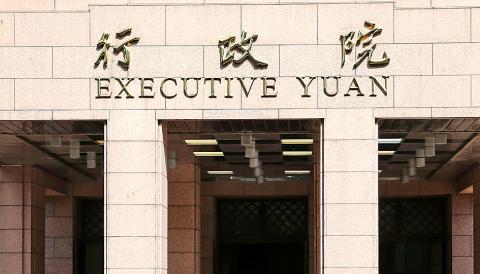The Executive Yuan has drafted an amendment to extend the period during which retired generals would be prohibited from traveling to China in an apparent response to two retired generals praising Chinese President Xi Jinping (習近平) at a political event in China last year.
The Executive Yuan on Thursday said it has drafted an amendment to the Act Governing Relations Between the People of the Taiwan Area and the Mainland Area (台灣地區與大陸地區人民關係條例) to extend the period during which former generals, mayors, science officials and intelligence officers must obtain Ministry of the Interior approval before they can travel to China to 15 years from three years.
The proposed amendment aims to prevent retired government and military officials from attending events in China that could unduly assert Chinese sovereignty over Taiwan, the Executive Yuan said.

Photo: CNA
The Chinese Communist Party’s (CCP) official People’s Daily on Jan. 29 reported that two retired Taiwanese generals, Huang Shing-chiang (黃幸強) and Chen Ting-chung (陳廷寵) in December last year attended the Cross-Strait Generals Forum in Xiamen in China’s Fujian Province.
The report was written by former Chinese-language People’s Liberation Army Daily president Huang Guozhu (黃國柱) and was titled: “Look over here, Taiwanese generals: Commemorating the 40th anniversary of the Message to Compatriots in Taiwan.”
At the event, Taiwanese generals discussed “reform and liberalization to jointly pursue development” with their Chinese counterparts, sang the Chinese national anthem and joined others in issuing an “initiative for peaceful unification,” the report said.
The generals also praised the “five points” that Xi mentioned in an address on Jan. 2, it said.
The paper quoted them as saying that China’s transformation to a more liberal economy has brought “tremendous benefits” to Chinese and Taiwanese, and that they endorsed the so-called “1992 consensus” and Beijing’s “one China” principle.
Huang was quoted as saying that “the hope of cross-strait unification must not evaporate. This is our shared goal as Chinese and members of the Zhonghua minzu [Chinese ethnic group, 中華民族].”
“When the development of Chinese culture reaches its climax, our nation shall be at its most powerful. Turning one’s back on Chinese culture would be forcing one’s self into oblivion,” Chen said, according to the report.
When reached for comment, Democratic Progressive Party Legislator Tsai Shih-ying (蔡適應) on Saturday said that soldiers have a duty to protect the nation, so if they ingratiate themselves with China, it would defeat the purpose of having a military.
Retired generals who ingratiate themselves with China do not deserve a pension, he added.
The “1992 consensus,” a term former Mainland Affairs Council chairman Su Chi (蘇起) in 2006 admitted to making up in 2000, refers to a tacit understanding between the Chinese Nationalist Party (KMT) and the CCP that both sides of the Taiwan Strait acknowledge there is “one China,” with each side having its own interpretation of what “China” means.

Tropical Storm Gaemi strengthened into a typhoon at 2pm yesterday, and could make landfall in Yilan County tomorrow, the Central Weather Administration (CWA) said yesterday. The agency was scheduled to issue a sea warning at 11:30pm yesterday, and could issue a land warning later today. Gaemi was moving north-northwest at 4kph, carrying maximum sustained winds near its center of up to 118.8kph and gusts of 154.8kph. The circumference is forecast to reach eastern Taiwan tomorrow morning, with the center making landfall in Yilan County later that night before departing from the north coast, CWA weather forecaster Kuan Shin-ping (官欣平) said yesterday. Uncertainty remains and

SEA WARNING LIKELY: The storm, named Gaemi, could become a moderate typhoon on Wednesday or Thursday, with the Taipei City Government preparing for flooding A tropical depression east of the Philippines developed into a tropical storm named Gaemi at 2pm yesterday, and was moving toward eastern Taiwan, the Central Weather Administration (CWA) said. Gaemi could begin to affect Taiwan proper on Tuesday, lasting until Friday, and could develop into a moderate typhoon on Wednesday or Thursday, it said. A sea warning for Gaemi could be issued as early as Tuesday morning, it added. Gaemi, the third tropical storm in the Pacific Ocean this typhoon season, is projected to begin moving northwest today, and be closest to Taiwan on Wednesday or Thursday, the agency said. Today, there would likely

DISRUPTIONS: The high-speed rail is to operate as normal, while several airlines either canceled flights or announced early departures or late arrivals Schools and offices in 15 cities and counties are to be closed today due to Typhoon Gaemi, local governments announced last night. The 15 are: Taipei, New Taipei City, Taoyuan, Tainan, Keelung, Hsinchu and Kaohsiung, as well as Yilan, Hualien, Hsinchu, Miaoli, Chiayi, Pingtung, Penghu and Lienchiang counties. People should brace for torrential rainfall brought by the storm, with its center forecast to make landfall on the east coast between tonight and tomorrow morning, the Central Weather Administration (CWA) said. The agency issued a sea warning for the typhoon at 11:30pm on Monday, followed by a land warning at 11:30am yesterday. As of

CASUALTY: A 70-year-old woman was killed by a falling tree in Kaohsiung as the premier warned all government agencies to remain on high alert for the next 24 hours Schools and offices nationwide are to be closed for a second day today as Typhoon Gaemi crosses over the nation, bringing torrential rain and whipping winds. Gaemi was forecast to make landfall late last night. From Tuesday night, its outer band brought substantial rainfall and strong winds to the nation. As of 6:15pm last night, the typhoon’s center was 20km southeast of Hualien County, Central Weather Administration (CWA) data showed. It was moving at 19kph and had a radius of 250km. As of 3pm yesterday, one woman had died, while 58 people were injured, the Central Emergency Operation Center said. The 70-year-old